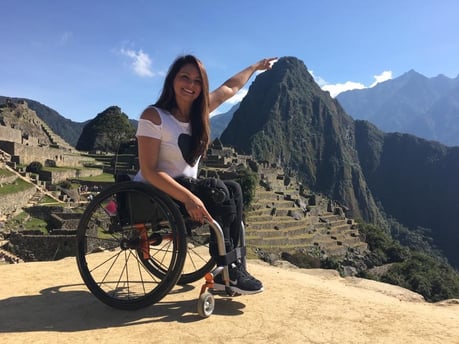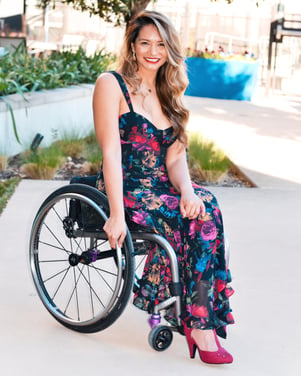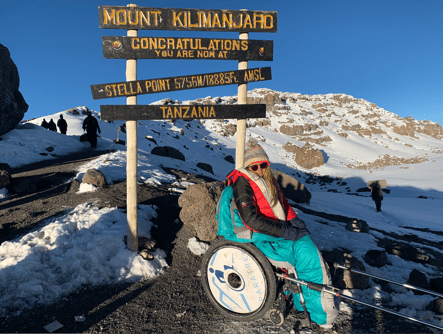Community Spotlight: Marcela Marañon
 In 2017, Marcela Marañon was officially bitten by the travel bug. Since then, she has traveled around the United States and to 17 countries, often on her own. She has made it to the top of Mt. Kilimanjaro, skied in the French Alps, and visited Macchu Picchu—and she did all of it despite being disabled and requiring a wheelchair to get around.
In 2017, Marcela Marañon was officially bitten by the travel bug. Since then, she has traveled around the United States and to 17 countries, often on her own. She has made it to the top of Mt. Kilimanjaro, skied in the French Alps, and visited Macchu Picchu—and she did all of it despite being disabled and requiring a wheelchair to get around.
Marañon grew up in Lima, Peru. When she was 20, she was injured in a car accident that left her paralyzed from the waist down; she also had to have her left leg amputated above the knee. Marañon is now 41 and lives with her 16-year-old daughter in Dallas.
Traveling the world in her wheelchair has made Marañon highly aware of which cities and locations are accessible to people with disabilities, and which are not. She uses her social media presence to chronicle her travels, inspire and inform others, and increase awareness of what is required to make it easier for disabled people to travel. Marañon’s Instagram account (@thejourneyofabravewoman) now has over 450,000 followers; TikTok (where she has more than 250,000 followers) named her a Latinx Trailblazer in 2021.
“There are many people like me that are afraid to travel,” she says. “They can watch me and get information on what a [certain city] looks like as far as accessibility.”
Marañon feels strongly about being a mentor and a role model, but she prefers to show rather than tell.
 “I am the type of person that I show you with actions, I share my life with you to see if that motivates you to keep moving forward. I don’t want to tell people to do this or that. When people watch me and see that I am traveling alone and doing cool things, they can say, ‘I can do the same.’”
“I am the type of person that I show you with actions, I share my life with you to see if that motivates you to keep moving forward. I don’t want to tell people to do this or that. When people watch me and see that I am traveling alone and doing cool things, they can say, ‘I can do the same.’”
She has strong opinions on which locations need improvement. “The U.S. does very good on buildings and cities, but they're terrible on beaches,” Marañon says. “They don't have wheelchair assistance, or beach wheelchairs, or parking close to the beach, or accessible toilets. It’s just very disorganized.”
Spain, she says, is among the more accessible countries. In general, she finds that older, historic locations and buildings are among the least accessible places because there is a concern that adding modifications will cause structural damage–but Marañon isn’t buying it.
“I don’t think it’s impossible to make something accessible,” she says. “I have seen lifts or small elevators that can modify those buildings and don't do anything to the structure. I think that there just has to be the will to make that place more accessible for people with disabilities. It’s like the saying, ‘where there is a will, there is a way.’”
In addition to using social media as a source of inspiration and information, Marañon wants to make people in the travel and hospitality industries aware of how they could do better.
“I think that people that don’t know much about accessibility do not know that accommodations are needed,” she says. “Because maybe some of these people are Airbnb hosts or something and, you know, what about if someone in a wheelchair comes in?
“I’ve had a lot of people message me and say, ‘Thank you. I didn't know that you guys needed that. So I'm making my place accessible.’”
 Marañon gives an example of the types of challenges she faces on a daily basis just getting from place to place. “Let’s say I'm riding in an Uber and the driver has never had a rider with a disability and his car is not modified. While he is helping me to get into the car, and putting the wheelchair in the back, he's learning something about disability. I think that this can help him for the next disabled person he [picks up]. He's going to do a better job because he has already experienced something with me. I always think about that— educating people without telling them I'm educating them. It's just like teaching them or showing them how they can help us.”
Marañon gives an example of the types of challenges she faces on a daily basis just getting from place to place. “Let’s say I'm riding in an Uber and the driver has never had a rider with a disability and his car is not modified. While he is helping me to get into the car, and putting the wheelchair in the back, he's learning something about disability. I think that this can help him for the next disabled person he [picks up]. He's going to do a better job because he has already experienced something with me. I always think about that— educating people without telling them I'm educating them. It's just like teaching them or showing them how they can help us.”
Marañon’s positive can-do spirit is infectious. She has become an influencer and has landed several partnerships with brands such as Clinique and Amazon Fashion. She was also a brand ambassador for ReWalk, a company that makes exoskeletons, which allow those with paralysis to stand up and walk as a form of rehabilitation.
In 2020, Marañon founded The Journey of a Brave Woman Shop, an online merchandise store that supports wheelchair accessibility across the world. Marañon donates a percentage of earnings to countries that have very few accommodations for disabled people. She has provided ramps and wheelchairs and made a tennis court accessible for the adaptive tennis team in Bangalore, for example. “She also hosted an event for 20 disabled kids in a fully accessible restaurant, “so they could feel what it’s like to be in an accessible place without struggling, and have a good time.”
“Everything is always going to be a challenge because the world is not made for people in wheelchairs and for me,” says Marañon. “So I try to do the best I can.”
Join Our Movement
What started as an idea has become a national movement. With your support, we can influence policy and inspire lasting change.
Become an Advocate